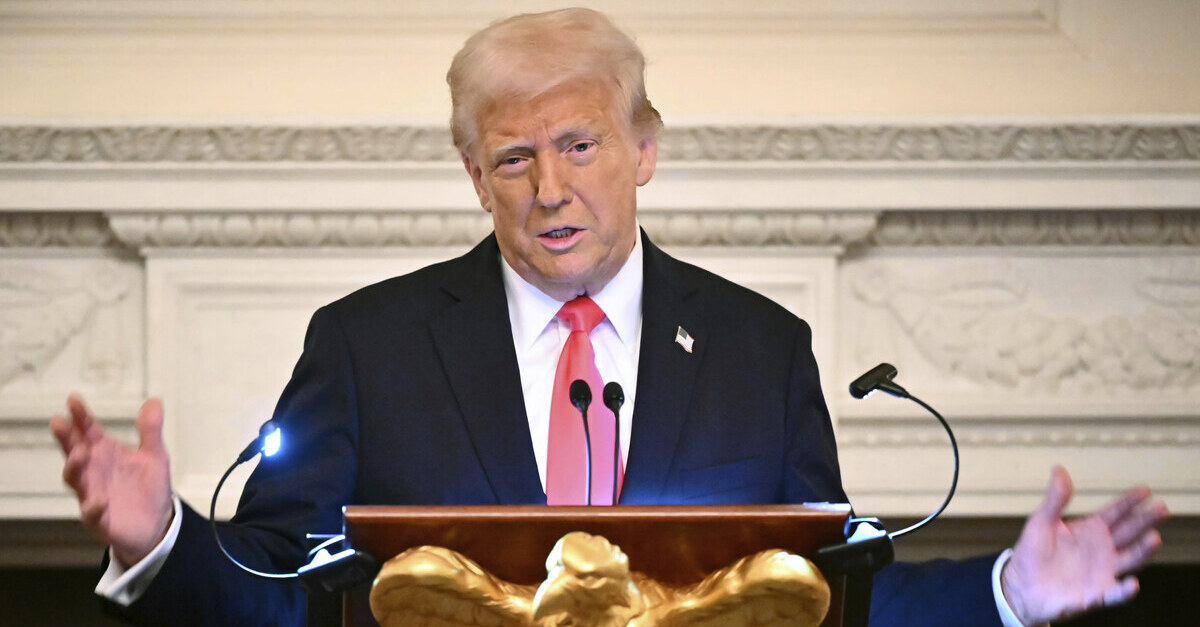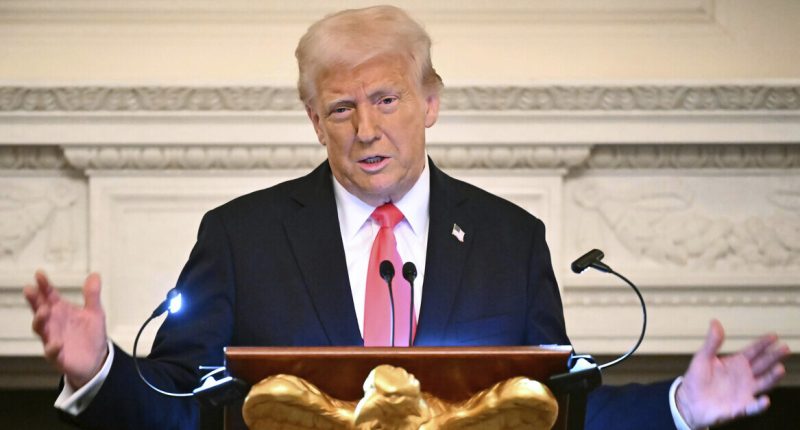
President Donald Trump gestures as he speaks during an Iftar dinner in the State Dining Room at the White House in Washington, Thursday, March 27, 2025 (Pool via AP).
A federal appeals court in Colorado has rejected an emergency request from the Trump administration seeking to stay a lower court ruling temporarily blocking the federal government from using an 18th-century wartime authority to fast-track the removal of Venezuelan migrants with limited notice and minimal, if any, due process.
A three-judge panel on the U.S. Court of Appeals for the 10th Circuit on Tuesday kept in place a temporary retraining order (TRO) issued on April 22 by U.S. District Judge Charlotte N. Sweeney barring deportations in Colorado under the Alien Enemies Act (AEA).
In a two-page order, the panel reasoned that the administration was not entitled to a stay of the TRO because it did not show that leaving the order in place was “likely” to cause the government to suffer “irreparable harm.”
“The government has not made such a showing in this case,” the panel wrote in the brief two-page opinion. “All members of the class are in federal custody. And given the important unresolved issues under the Alien Enemies Act and the ruling of the United States Supreme Court that no one in that proceeding be removed under the AEA until further order of that Court, there is no realistic possibility that the government could remove any member of the class from this country before final expiration of the TRO on May 6, 2025.”
“Accordingly, the emergency motion for a stay is denied,” the order concluded.
The wartime measure has been a focal point for litigation since the administration in March sent 137 migrants to a notorious work prison in El Salvador, apparently without due process, despite a court order instructing the government to return the migrants to the United States.
Federal judges in California, New York, Massachusetts, and Texas — in a case that reached the Supreme Court — have also issued court orders temporarily barring the administration from deportations under the AEA.
Sweeney had expressed doubt that Trump invocation of the AEA was constitutional, finding that the president’s March 15 proclamation was divorced from both facts and law.
Citing the original authors of several now-prominent and authoritative dictionaries, texts explaining how language was understood by the Founders, and decades of case law, Sweeney determined that the U.S. is simply not in an actual war with Venezuela or a transnational gang from within its borders, nor was the country experiencing an “invasion or predatory incursion,” as is expressly necessary for invoking the AEA.
“Satisfied with what ‘invasion’ and ‘predatory incursion’ mean, the Court could stop,” Sweeney wrote. “These words, fundamentally, demand military and wartime action. The Proclamation makes no finding that satisfies these definitional demands. Thus, to the extent the Proclamation relies on the Act’s ‘invasion’ and ‘incursion’ provisions to justify its removal powers, it does so improperly.”
Not content to leave the issue of warfare ambiguous, the judge cited recent precedent on the AEA — specifically from the case that led to the U.S. Supreme Court‘s recent guidance that all potential AEA detainees are entitled to due process via petitioning for writs of habeas corpus.
“A central limit to this power is the Act’s conditional clause — that the United States be at war or under invasion or predatory incursion,” the court’s order reads, quoting U.S. Circuit Judge Karen L. Henderson.
The order goes on, at length:
Petitioners’ first argument, proceeds from a straightforward premise. The President’s authority under the Proclamation is “vested” under the Act. The Act demands, as a “statutory requirement,” an “invasion or predatory incursion.” And because the Act’s “text and history” use these terms “to refer to military actions indicative of an actual or impending war” — not “mass illegal migration” or “criminal activities” — the Act cannot sustain the Proclamation. The Court agrees with Petitioners.
Prior to issuing her written order, Sweeney voiced concerns that the government’s resumption of swift and collective deportation flights using the obscure, 18th-century wartime authority was likely to run afoul of due process. The court’s order formalized those concerns by extending an extant temporary restraining order until May 6.
“Petitioners have shown there is a ‘substantial risk that the harm’ of being subject to the Proclamation will arise — despite their current designation as individuals who do not fall under it,” Sweeney wrote. “Should their designation change, the Court has grave concerns that Petitioners would be afforded notice that comports with due process to challenge the determination.”
Love true crime? Sign up for our newsletter, The Law&Crime Docket, to get the latest real-life crime stories delivered right to your inbox.







